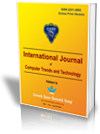Mining Frequent Itemsets Using Apriori Algorithm
 | International Journal of Computer Trends and Technology (IJCTT) |  |
| © - April Issue 2013 by IJCTT Journal | ||
| Volume-4 Issue-4 | ||
| Year of Publication : 2013 | ||
| Authors : Jogi.Suresh, T.Ramanjaneyulu |

Jogi.Suresh, T.Ramanjaneyulu "Mining Frequent Itemsets Using Apriori Algorithm"International Journal of Computer Trends and Technology (IJCTT),V4(4):760-764 April Issue 2013 .ISSN 2231-2803.www.ijcttjournal.org. Published by Seventh Sense Research Group.
Abstract: --Mining required data from voluminous Data has been recognized as one of the most challenging problems in data mining approach. In many real world scenarios, the data is not extracted from single data source but from distributed and heterogeneous data sources. The discovered knowledge is expected comprehensive so that it can better fit in business environment Enterprise data mining applications involve dealing with complex data such as data from multiple heterogeneous data sources, extracting data in single step from such data sources such data sources is time and space consuming. So effective approaches are needed to decrease the time as well as space. Here we use Apriori Algorithm for discovering informative patterns in complex data sets.
References-
[1] Jiawei Han, Jian Pei, and Yiwen Yin, “Mining Frequent Patterns without Candidate Generation” SIGMOD`2000 Paper ID: 196.
[2] Agrawal R, Srikant R (1994) Fast algorithms for mining association rules. In: Proceedings of the 20th VLDB conference, pp 487–499.
[3] J. Han, M. Kamber (2001), Data Mining, Morgan Kaufmann Publishers, San Francisco, CA.
[4] R. Agrawal and R. Srikant. Fast algorithms for mining association rules in large databases. In J. Bocca, M. Jarke, and C. Zaniolo, editors, Proc. Int. Conf. on Very Large Data Bases, pages 478–499, Santiago, Chile, 1994.
[5] Craus M., Archip A., A Generalized Parallel Algorithm for Frequent Itemset Mining, Proceedings of the 12th WSEAS International Conference on Computers, Heraklion, Greece, 2008, pg. 520-523.
Keywords — heterogeneous data, complex data, frequent patterns, informative patterns
